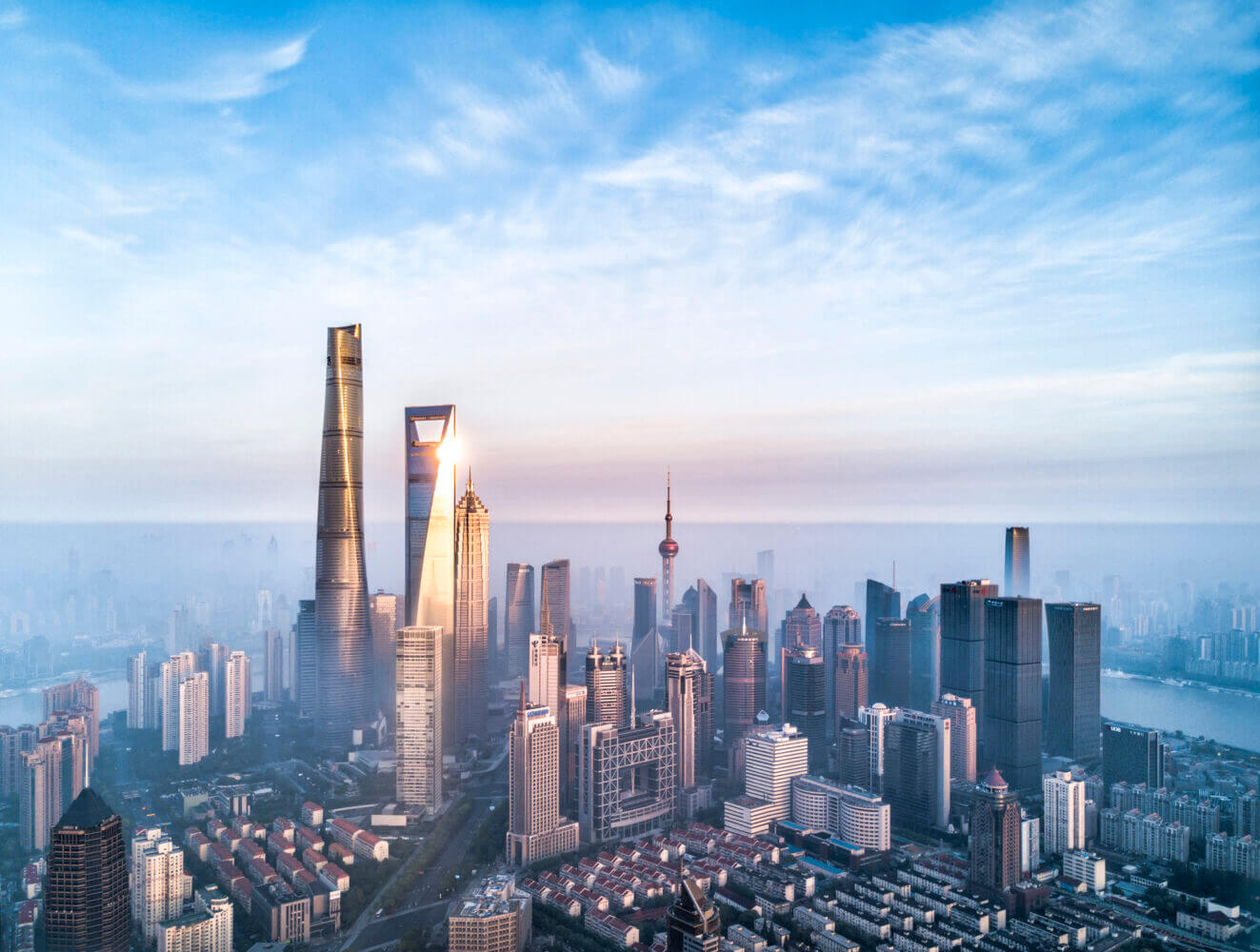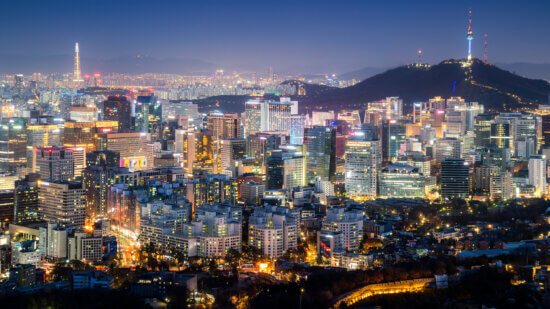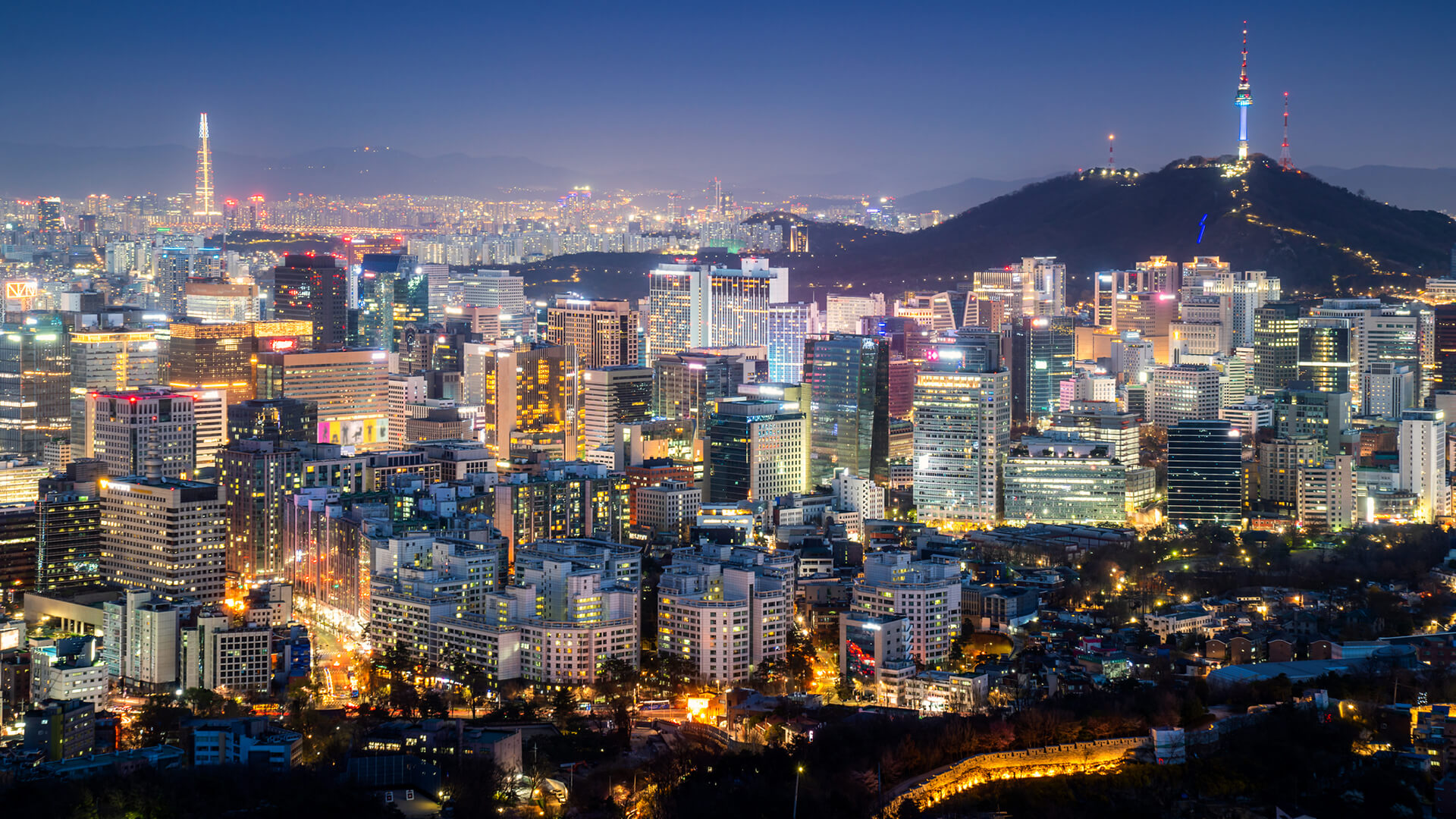
Thornburg Portfolio Manager Lei “Rocky” Wang provides an update on China, including the lockdown of Shanghai and its economic impact.
China Update: From Lockdown to Slowdown
Lei Wang: Shanghai is one of the largest a shipping center or the world’s largest container port in the world. And if definitely this is currently, we see some disruption of a global supply chain if things cannot ship that Shanghai to the cross Pacific into this country, I think they’re just definitely adding more fuel to the inflation fire from here.
Craig Blessing: Hi and welcome to another episode of Away from the Noise Thornburg Investment Management’s podcast on key investment topics, economics and market developments of the day. I’m Craig Blessing, Client Portfolio Manager for International Equity at Thornburg and I’ll be your host. Joining us today is Lei Wang Rocky, a managing director and portfolio manager for International Equity and International Equity ESG Strategies.
Rocky grew up and went to university in Shanghai and worked for China’s central bank before coming to the U.S. and joining Thornburg in 2004. So Rocky, it’s been a pretty news-filled year so far both globally and in China but something which has obviously been big news is the Omicron outbreak in China and the lockdown of 25 million people in Shanghai.
What are you hearing about how things are progressing?
Lei Wang: Thank you Craig. My hometown Shanghai I just said to 25 million big cities like a one that was European countries in Europe. It’s a very chaotic situation over there. And right now, last night ourselves the 20,000 plus cases on the daily basis infection cases and still rising and whole residents whole population are locked down at home.
I just want to give a different flavor here. You know in the US we have a lockdown, but you know all the house can over a spread out is a big country people living with a quite a distance from each other but in Shanghai which is big city most people living their high-rise intensive kind of condo residential format that makes this disease more likely spread quite fast than probably you saw here the U.S. last year.
So, second is the local grassroots level managing this crisis. I would say incompetent you know is like the put all as the daily operation in the hands of HOA equivalent in the U.S. that is 25 million people, they need food and they need grocery their pets need food the senior people in the hospital, there’s things over there just so unprepared before this happened.
I think that’s something the Chinese local government probably need a dear lesson will pay a dear price for things like this.
Craig Blessing: So, there’s also been news here about a little bit of objection on the part of the population to the lockdown, which is now rocky what, four weeks, you said. So there’s been news here that there’s been some backlash against the lockdown and there’s certainly been news in the West about the potential market ripples of this lockdown in China.
What economic and political impacts do you think this will have in the long run? And is China going to have to back down on its zero COVID policy?
Lei Wang: That’s very good questions. And then this is for some part I do not answer at this moment. But, you know, based on what we witness in this country, I think I believe, and I’m think and the cases in China, in Shanghai, will inevitably decline just as we were also witnessed here in the U.S. Second, hopefully, is all we think will contain within Shanghai.
Another spread in the other part of China. And that could be pretty good headache for the local politician. And in the long run, I think inevitably, I think in China, the so-called herd immunity will achieve. And I think that will probably trigger some relief for the Chinese. Such harsh COVID policy. Yeah, definitely. This is a consequence of the current situation in Shanghai.
Don’t forget, Shanghai is one of the largest a shipping center or the world’s largest container port in the world. And if definitely this is currently, we see some disruption of a global supply chain if things cannot ship that Shanghai to the cross Pacific into this country, I think they’re just definitely adding more fuel to the inflation fire from here.
So, there’s something we should be recognize and monitor closely. And in the near-term or short term, you probably see some dramatic slowing down the China GDP growth or even confusing hard lending. But our quantify it as a short term by the long term consequence is you’ll probably continue to say so-called acceleration in a global reshoring to other emerging markets and even to home countries like here in the States or in Europe.
Craig Blessing: So, what has been big news in the West is the conflict in Ukraine. How is it being covered in China? And do you think there’s the potential for an economic or political impact to China from the conflict?
Lei Wang: Yeah, that’s another good one. And like impact on other countries and economic ramification similar to China is as well. Such a high energy cost and a growing import disruption and other critical parts related industrial supply disruption as well. And in terms of China media, local coverage I would say for the most apart their opinion are pretty neutral. And don’t forget that China has very close relationship with both Russia and Ukraine.
And both countries are exported to China in terms of industrial equipment, agriculture, and the Ukraine even host one of the largest oversea Chinese students study in Ukraine. So hopefully with a status like this, I believe maybe China could play a so-called peacemaking role in the middle and help things de-escalate for both Ukraine and Russia. And that’s a good for everyone.
[At the] end of the day, don’t forget, yes, the Chinese definitely need a very steady, dependable energy supply from countries like Russia or other countries. But the Chinese politician also recognize they need to find the balance between, let’s say, and the U.S. and the Europeans are still the major destination, than Chinese exports. They are actually the largest Chinese largest trading partner in terms of trading volume with a Europe and the U.S.
So, I would say they’re peaceful, a stable world, actually, is in the best interest of China. Don’t forget, Chinese economy overall is still a so-called mercantile economy. So, a very good stable, steady world set ups is good for the best interest of China.
Craig Blessing: Many in the West, including many of our clients, give a high probability of a Chinese invasion of Taiwan at some point. From our conversations, I know you give it a lower probability than most. Why is that?
Lei Wang: Politicians make their decision based on their intelligence or ideology. Sometime could be quite different from other conclusions. So, let’s just put that in a context. So, yes, my answer is yes. Based on my own assessment, I think it’s a low probability of China invading Taiwan. Now, I’ll give you three reasons. The first one, I would say military value, right?
You know, Ukraine I think for most part maybe serve as a military conflict buffer zone between the Russia and NATO and given the Ukraine, the mass size is one of the largest country in the Europe by the Taiwan, you know, on the other hand, is very small country is like what size is that like 36,000 kilometer square and does one with a 23 million people.
So, the size the country doesn’t have that kind of so-called military value as a buffer between China or any potential rival. So, from that perspective is a low probability. Second, economic value, right. Taiwan, GDP’s close to 750 billion U.S. dollars or 33,000 U.S. dollars per capita. And the Ukraine is just like a 20% of that are so smaller in economic size and the Taiwan yes, we all recognize Taiwan is one of the top players or leader in the global semi technology or equipment is exporter driven economy not energy-driven versus Ukraine heavily depending on like energy fertilizers for crops, so I assume I hope not, China take over Taiwan. What they can get other things, right, is if the moment they do it likely China probably will be punished by the so-called global sanctions, and they can sitting on a bunch of other foundries or factories. But what can they get other things so they can sell anything to the rest of world.
So, I would call this a losing situation. So, there’s a second reason, third timing-wise, as I mentioned earlier, China current is struggling with a very sluggish economy growth and the consumption is weak, property is in a bubble and you know, if you’re the politician, you probably don’t want to launch any kind of military activity then you yourself are plagued by most serious matters at home. And so that’s something I think the window of so-called elevated of military action is a very low it’s not there at all. So that’s the third reason. So net-net, I would say, low probability for China invading Taiwan.
Craig Blessing: Since its peak in February 2021 Chinese markets are down 44% while international markets are down just 6% and the S&P 500 is actually up 16%. That’s a pretty big performance gap. Do you think China’s markets are cheap and if not what do you think you would have to see for them to be an opportunity?
Lei Wang: I checked the Chinese stock index level valuation using MSCI China index is trading around ten times forward multiple. That’s almost like 6-7 years new low for the past 6-7 years optically cheap you’re right. But, you know, I want to caution our audience, the earnings from here probably will have to face some kind of downward adjustment and actually so the actual PE may not as achieve as optically if just by earnings.
Just to give you historical context and bottom multiple for the Chinese index is around eight times which happened around 11 years ago. So that’s something just keep that in mind. And I think those things could be a long term a host of Russia and the Ukraine situation I think probably the Chinese stock as asset class maybe will be scrutinized by many international pensioner or investors and so this is some heavy cloud in the sky including as I mentioned the earlier the so called a regionalization a global supply chain or you some people call reshoring or onshoring and second I think to jumpstart the Chinese economy from here you need a quite effective stimulus what could be export no I think is and is not beyond is beyond the China’s control is really dependent that the other countries that are consumer demand. Fix asset investment? I think that’s probably China overbuilt a lot of capacity and the return of those of a fixed asset investment just low and consumption currently is heavily plagued by the COVID policies, so it’s not a kind of optimistic in the near term and another data point, China GDP is run 18 trillion U.S. dollars make the Chinese second largest economy or $10,000 a per capita basis.
You know China is no more the same China as ten years ago even 20 years ago it just the sheer size of the economy is huge. So any policy to be effective need to be very thoughtful very effective to make things work. So net, net I want to sound cautious but again I think it is in this environment you can always find interesting stock and opportunity and a risk in my opinion always is always hand in hand so that’s gave us opportunity if any interesting market correction happen and definitely there’s a great opportunity for us.
Craig Blessing: And a wrap up question. So, what would you have to see in the market or the economy that might make you change your mind and turn more bullish on China?
Lei Wang: This year when the US tightening, China definitely is a loosening on a credit extension. Monetary policy, credit policy. I want to see the sustainable availability of credit into the real economy. I want to see the Chinese M2. The money supply numbers have a solid recovery or even on the high end of the growth. I think that will help the real economy.
Second, that definitely I will see some fine tuning of the Chinese COVID policy I just said the three driver China economy grows: export, beyond other control; fix asset investment, already overbuilt; The only thing left for the Chinese as a policy tool is trying to jumpstart the consumption, but the consumption is heavily impacted by the mobility of the population.
So, if any fine-tuning Covid or improvement in Covid aging in China apparently will see some pent-up demand from the consumer size that definitely how China stabilize the economy from here.
Craig Blessing: Thank you Rocky.
Lei Wang: Thank you for having me here.
Craig Blessing: And thank you for listening you can find us on Thornburg.com/podcasts as well as on Apple Podcasts where you can rate subscribe and review us. Please join us again soon for the next episode of Away from the Noise. And thanks again.
Lei Wang: Shanghai is one of the largest a shipping center or the world’s largest container port in the world. And if definitely this is currently, we see some disruption of a global supply chain if things cannot ship that Shanghai to the cross Pacific into this country, I think they’re just definitely adding more fuel to the inflation fire from here.
Craig Blessing: Hi and welcome to another episode of Away from the Noise Thornburg Investment Management’s podcast on key investment topics, economics and market developments of the day. I’m Craig Blessing, Client Portfolio Manager for International Equity at Thornburg and I’ll be your host. Joining us today is Lei Wang Rocky, a managing director and portfolio manager for International Equity and International Equity ESG Strategies.
Rocky grew up and went to university in Shanghai and worked for China’s central bank before coming to the U.S. and joining Thornburg in 2004. So Rocky, it’s been a pretty news-filled year so far both globally and in China but something which has obviously been big news is the Omicron outbreak in China and the lockdown of 25 million people in Shanghai.
What are you hearing about how things are progressing?
Lei Wang: Thank you Craig. My hometown Shanghai I just said to 25 million big cities like a one that was European countries in Europe. It’s a very chaotic situation over there. And right now, last night ourselves the 20,000 plus cases on the daily basis infection cases and still rising and whole residents whole population are locked down at home.
I just want to give a different flavor here. You know in the US we have a lockdown, but you know all the house can over a spread out is a big country people living with a quite a distance from each other but in Shanghai which is big city most people living their high-rise intensive kind of condo residential format that makes this disease more likely spread quite fast than probably you saw here the U.S. last year.
So, second is the local grassroots level managing this crisis. I would say incompetent you know is like the put all as the daily operation in the hands of HOA equivalent in the U.S. that is 25 million people, they need food and they need grocery their pets need food the senior people in the hospital, there’s things over there just so unprepared before this happened.
I think that’s something the Chinese local government probably need a dear lesson will pay a dear price for things like this.
Craig Blessing: So, there’s also been news here about a little bit of objection on the part of the population to the lockdown, which is now rocky what, four weeks, you said. So there’s been news here that there’s been some backlash against the lockdown and there’s certainly been news in the West about the potential market ripples of this lockdown in China.
What economic and political impacts do you think this will have in the long run? And is China going to have to back down on its zero COVID policy?
Lei Wang: That’s very good questions. And then this is for some part I do not answer at this moment. But, you know, based on what we witness in this country, I think I believe, and I’m think and the cases in China, in Shanghai, will inevitably decline just as we were also witnessed here in the U.S. Second, hopefully, is all we think will contain within Shanghai.
Another spread in the other part of China. And that could be pretty good headache for the local politician. And in the long run, I think inevitably, I think in China, the so-called herd immunity will achieve. And I think that will probably trigger some relief for the Chinese. Such harsh COVID policy. Yeah, definitely. This is a consequence of the current situation in Shanghai.
Don’t forget, Shanghai is one of the largest a shipping center or the world’s largest container port in the world. And if definitely this is currently, we see some disruption of a global supply chain if things cannot ship that Shanghai to the cross Pacific into this country, I think they’re just definitely adding more fuel to the inflation fire from here.
So, there’s something we should be recognize and monitor closely. And in the near-term or short term, you probably see some dramatic slowing down the China GDP growth or even confusing hard lending. But our quantify it as a short term by the long term consequence is you’ll probably continue to say so-called acceleration in a global reshoring to other emerging markets and even to home countries like here in the States or in Europe.
So, the big news in the West is the conflict in Ukraine. How is it being covered in China? And do you think there’s the potential for an economic or political impact to China from the conflict?
Lei Wang: Yeah, that’s another good one. And like impact on other countries and economic ramification similar to China is as well. Such a high energy cost and a growing import disruption and other critical parts related industrial supply disruption as well. And in terms of China media, local coverage I would say for the most apart their opinion are pretty neutral. And don’t forget that China has very close relationship with both Russia and Ukraine.
And both countries are exported to China in terms of industrial equipment, agriculture, and the Ukraine even host one of the largest oversea Chinese students study in Ukraine. So hopefully with a status like this, I believe maybe China could play a so-called peacemaking role in the middle and help things de-escalate for both Ukraine and Russia. And that’s a good for everyone.
[At the] end of the day, don’t forget, yes, the Chinese definitely need a very steady, dependable energy supply from countries like Russia or other countries. But the Chinese politician also recognize they need to find the balance between, let’s say, and the U.S. and the Europeans are still the major destination, than Chinese exports. They are actually the largest Chinese largest trading partner in terms of trading volume with a Europe and the U.S.
So, I would say they’re peaceful, a stable world, actually, is in the best interest of China. Don’t forget, Chinese economy overall is still a so-called mercantile economy. So, a very good stable, steady world set ups is good for the best interest of China.
Many in the West, including many of our clients, give a high probability of a Chinese invasion of Taiwan at some point. From our conversations, I know you give it a lower probability than most. Why is that?
Lei Wang: Politicians make their decision based on their intelligence or ideology. Sometime could be quite different from other conclusions. So, let’s just put that in a context. So, yes, my answer is yes. Based on my own assessment, I think it’s a low probability of China invading Taiwan. Now, I’ll give you three reasons. The first one, I would say military value, right?
You know, Ukraine I think for most part maybe serve as a military conflict buffer zone between the Russia and NATO and given the Ukraine, the mass size is one of the largest country in the Europe by the Taiwan, you know, on the other hand, is very small country is like what size is that like 36,000 kilometer square and does one with a 23 million people.
So, the size the country doesn’t have that kind of so-called military value as a buffer between China or any potential rival. So, from that perspective is a low probability. Second, economic value, right. Taiwan, GDP’s close to 750 billion U.S. dollars or 33,000 U.S. dollars per capita. And the Ukraine is just like a 20% of that are so smaller in economic size and the Taiwan yes, we all recognize Taiwan is one of the top players or leader in the global semi technology or equipment is exporter driven economy not energy-driven versus Ukraine heavily depending on like energy fertilizers for crops, so I assume I hope not, China take over Taiwan. What they can get other things, right, is if the moment they do it likely China probably will be punished by the so-called global sanctions, and they can sitting on a bunch of other foundries or factories. But what can they get other things so they can sell anything to the rest of world.
So, I would call this a losing situation. So, there’s a second reason, third timing-wise, as I mentioned earlier, China current is struggling with a very sluggish economy growth and the consumption is weak, property is in a bubble and you know, if you’re the politician, you probably don’t want to launch any kind of military activity then you yourself are plagued by most serious matters at home. And so that’s something I think the window of so-called elevated of military action is a very low it’s not there at all. So that’s the third reason. So net-net, I would say, low probability for China invading Taiwan.
Since its peak in February 2021 Chinese markets are down 44% while international markets are down just 6% and the S&P 500 is actually up 16%. That’s a pretty big performance gap. Do you think China’s markets are cheap and if not what do you think you would have to see for them to be an opportunity?
Lei Wang: I checked the Chinese stock index level valuation using MSCI China index is trading around ten times forward multiple. That’s almost like 6-7 years new low for the past 6-7 years optically cheap you’re right. But, you know, I want to caution our audience, the earnings from here probably will have to face some kind of downward adjustment and actually so the actual PE may not as achieve as optically if just by earnings.
Just to give you historical context and bottom multiple for the Chinese index is around eight times which happened around 11 years ago. So that’s something just keep that in mind. And I think those things could be a long term a host of Russia and the Ukraine situation I think probably the Chinese stock as asset class maybe will be scrutinized by many international pensioner or investors and so this is some heavy cloud in the sky including as I mentioned the earlier the so called a regionalization a global supply chain or you some people call reshoring or onshoring and second I think to jumpstart the Chinese economy from here you need a quite effective stimulus what could be export no I think is and is not beyond is beyond the China’s control is really dependent that the other countries that are consumer demand. Fix asset investment? I think that’s probably China overbuilt a lot of capacity and the return of those of a fixed asset investment just low and consumption currently is heavily plagued by the COVID policies, so it’s not a kind of optimistic in the near term and another data point, China GDP is run 18 trillion U.S. dollars make the Chinese second largest economy or $10,000 a per capita basis.
You know China is no more the same China as ten years ago even 20 years ago it just the sheer size of the economy is huge. So any policy to be effective need to be very thoughtful very effective to make things work. So net, net I want to sound cautious but again I think it is in this environment you can always find interesting stock and opportunity and a risk in my opinion always is always hand in hand so that’s gave us opportunity if any interesting market correction happen and definitely there’s a great opportunity for us.
So, what would you have to see in the market or the economy that might make you change your mind and turn more bullish on China?
Lei Wang: This year when the US tightening, China definitely is a loosening on a credit extension. Monetary policy, credit policy. I want to see the sustainable availability of credit into the real economy. I want to see the Chinese M2. The money supply numbers have a solid recovery or even on the high end of the growth. I think that will help the real economy.
Second, that definitely I will see some fine tuning of the Chinese COVID policy I just said the three driver China economy grows: export, beyond other control; fix asset investment, already overbuilt; The only thing left for the Chinese as a policy tool is trying to jumpstart the consumption, but the consumption is heavily impacted by the mobility of the population.
So, if any fine-tuning Covid or improvement in Covid aging in China apparently will see some pent-up demand from the consumer size that definitely how China stabilize the economy from here.
Craig Blessing: Thank you Rocky.
Lei Wang: Thank you for having me here.
Craig Blessing: And thank you for listening you can find us on Thornburg.com/podcasts as well as on Apple Podcasts where you can rate subscribe and review us. Please join us again soon for the next episode of Away from the Noise. And thanks again.
Discover more about:
More Insights

Will Closing the Korea Discount Create Investment Opportunities?

Why Is There a Korea Discount?

The ABCs of Personal Finance

How to Position Bond Portfolios as the Fed Ponders a Pivot

Creating a Winning NCAA Basketball Tournament Bracket is More Challenging Than Successfully Selecting Stocks


